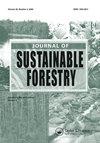Screening of Salt Tolerant Eucalyptus Clones Based on Physio-Morphological and Biochemical Responses Using Grey Relational Analysis
IF 1.8
4区 农林科学
Q3 FORESTRY
引用次数: 1
Abstract
ABSTRACT The salinity of the soil affects crop productivity. Approximately 20% of the total cropland and 33% of irrigated agricultural areas are salinized worldwide. Therefore, saline barren areas require plants that are tolerant of high saline levels. The objective of the current study is to investigate Eucalyptus clones that can thrive in high saline conditions. To achieve this goal, fifty Eucalyptus clones (E. camaldulensis, E. tereticornis) were irrigated with saline water (120 mM NaCl and 50 mM Na2SO4, electrical conductivity ≥20 dS ) for 3 months. To screen salt-tolerant clones, physiological, biochemical, and growth responses of clones were measured. The best performing clones under salt stress were chosen using Grey Relational Analysis (GRA), a Multiple Attribute Decision-Making (MADM) model, which is a novel approach to deal with this kind of screening study. As a result, the rank of (tolerant, moderate, and susceptible) clones was calculated, based on Grey Relational Grade (GRG). The value of GRG was based on the physio-morphological and biochemical responses of clones, indicating their greater ability to withstand saline stress. Results of this study suggest some salt-tolerant clones for the utilization of salt-affected locations to grow Eucalyptus plants, which may help to increase forest sustainability.基于生理形态和生化反应的灰关联分析筛选桉树耐盐无性系
摘要土壤的盐度影响作物的生产力。全世界约有20%的农田和33%的灌溉农业区被盐碱化。因此,盐碱地需要能够耐受高盐分的植物。本研究的目的是研究能够在高盐条件下茁壮成长的桉树无性系。为了实现这一目标,用盐水(120mM NaCl和50mM Na2SO4,电导率≥20dS)灌溉50个桉树无性系(E.camaldulensis,E.tereticornis)3个月。为了筛选耐盐克隆,测定了克隆的生理、生化和生长反应。利用灰色关联分析(GRA),一种多属性决策(MADM)模型,选择了盐胁迫下表现最好的无性系,这是处理这类筛选研究的一种新方法。结果,基于灰色关联度(GRG)计算了(耐受、中度和易感)克隆的等级。GRG的值是基于克隆的生理形态和生化反应,表明它们具有更大的耐盐能力。这项研究的结果表明,一些耐盐无性系可以利用受盐影响的地区种植桉树,这可能有助于提高森林的可持续性。
本文章由计算机程序翻译,如有差异,请以英文原文为准。
求助全文
约1分钟内获得全文
求助全文
来源期刊

Journal of Sustainable Forestry
Social Sciences-Geography, Planning and Development
CiteScore
3.90
自引率
12.50%
发文量
42
期刊介绍:
Journal of Sustainable Forestry publishes peer-reviewed, original research on forest science. While the emphasis is on sustainable use of forest products and services, the journal covers a wide range of topics from the underlying biology and ecology of forests to the social, economic and policy aspects of forestry. Short communications and review papers that provide a clear theoretical, conceptual or methodological contribution to the existing literature are also included in the journal.
Common topics covered in the Journal of Sustainable Forestry include:
• Ecology, management, recreation, restoration and silvicultural systems of all forest types, including urban forests
• All aspects of forest biology, including ecophysiology, entomology, pathology, genetics, tree breeding, and biotechnology
• Wood properties, forest biomass, bioenergy, and carbon sequestration
• Simulation modeling, inventory, quantitative methods, and remote sensing
• Environmental pollution, fire and climate change impacts, and adaptation and mitigation in forests
• Forest engineering, economics, human dimensions, natural resource policy, and planning
Journal of Sustainable Forestry provides an international forum for dialogue between research scientists, forest managers, economists and policy and decision makers who share the common vision of the sustainable use of natural resources.
 求助内容:
求助内容: 应助结果提醒方式:
应助结果提醒方式:


